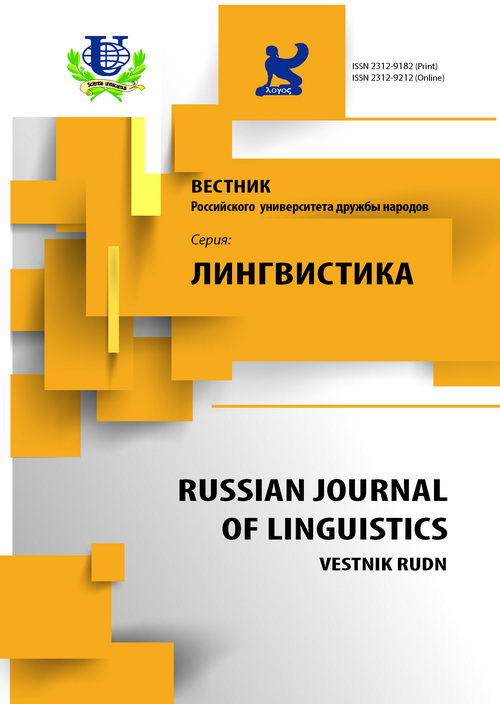No 2 (2011)
- Year: 2011
- Articles: 17
- URL: https://journals.rudn.ru/linguistics/issue/view/598
Articles
The problem of scientific hypermedia discourse perception
Abstract
The article considers the experimental data on the scientific discourse perception. The development of hypermedia technologies led to the changes in the interaction between the addressee and the addressant, the text and the recipient. Particular attention is paid to the analysis of the factors which successful communication is based on.
Russian Journal of Linguistics. 2011;(2):5-10
 5-10
5-10


Three periods of culture in the history of one borrowing
Abstract
The article is devoted to the semantic development of the paronymous borrowings recruit and recruiter in different periods of culture. The paronymous terms recruit and «recruiter» were studied in the period of tsarist Russia, market economy and in the post-industrial period. In each period the content of the borrowings changed.
Russian Journal of Linguistics. 2011;(2):11-19
 11-19
11-19


Comparative analysis of phraseological units of Body parts lexico-semantic field (on the material of Arabic, Avar and Russian languages)
Abstract
The article attempts to study phraseological units with somatic body parts component of the Arabic language in comparison with Аvar and Russian languages. The paper covers the following problems: the comparison of phraseological units of three unrelated languages, the exposure of semantic peculariaties of analyzed somatic phraseological units, the description of structural-grammatical composition of Arabic, Avar and Russian somatic phraseological units, the research of interlanguage equivalence of somatic phraseological units in compared languages.
Russian Journal of Linguistics. 2011;(2):20-27
 20-27
20-27


Language mechanism used to manipulate publics opinion in English and Russian news texts
Abstract
The paper touches upon some implicit language mechanisms used by British, American and Russian mass media, particulary in news texts, to influence public opinion by forming some specific stereotypes in the minds of the masses while relating to political and social events as well as countries and public figures.
Russian Journal of Linguistics. 2011;(2):28-37
 28-37
28-37


Verbal adverb in the Russian language and the ways of its translation into Persian with the regard for the aspects of the verb
Abstract
The current article is dedicated to the problems of verbal adverb's understanding among Persian-speaking students and it also focuses on equivalents of its translation into Persian. Because of absence of verbal adverb's category in Persian and since it is formed by two aspects which have no equivalents in Persian, studying of verbal adverb presents serious difficulties for Persian-speaking students.
Russian Journal of Linguistics. 2011;(2):38-43
 38-43
38-43


Some stylistic and syntactic devices of expansion and complication of a German advertising sentence in translation into Russian
Abstract
The translate of an advertising text of source language doesn't fully correspond the criteria of communicative equivalence without an adequate transfer of the invariant functional dominance, the construction, which expands or complicates the syntactic structure of an advertising sentence. Alternative correspondences of the target language, which fully transfer the meaning of such construction in certain cases of its usage, are often being found in macrocontext in the process of translation of such constructions.
Russian Journal of Linguistics. 2011;(2):44-50
 44-50
44-50


Compliments play the role as an important behavioral culture factor in modern society (based on the materials in Russian and Vietnamese)
Abstract
This article studies on compliments as an important factor of cultured behaviors in communication, and on their rules and impacts in various aspects of modern life. The analysis is based on Russian and Vietnamese materials which include the most typical situations.
Russian Journal of Linguistics. 2011;(2):51-58
 51-58
51-58


Extention of terms referred to social dialects in Russian and Spanish linguistics
Abstract
The author investigates terminological units referred to various types of sociolects in Russian and Spanish linguistic traditions. The article lists main terms in both sociolinguistic schools offering a brief historical note for each of them, and makes a brief comparative analysis of the classifications.
Russian Journal of Linguistics. 2011;(2):59-68
 59-68
59-68


Lexical incompatability as a means of creating illogical phrases in fiction texts
Abstract
In the article under discussion the ways of creating illogical word combinations by means of using the lexical units aimed to create semantic-logical incongruity in fiction texts are analyzed. The use of lexical means causing incompatibility in fiction texts are illustrated in the classical literature quotations.
Russian Journal of Linguistics. 2011;(2):69-76
 69-76
69-76


Frame as representation of knowledge in the cognitive aspect
Abstract
The article is devoted to the problem of representation of different types of knowledge in cognitive linguistics. The author makes a special emphasis on the presentation of frame which is considered to be one of the cognitive structures of knowledge within the meaning of words.
Russian Journal of Linguistics. 2011;(2):77-81
 77-81
77-81


Valuating element sign modification of the meaning of some words of the German language in the period of Nazi Diktatorship in Germany
Abstract
The reasons of valuating element sign modification of some words are often out of the laguage sphere. Sometimes under the influence of extralinguistic factors a neutral from the point of viev of valuation word can gain a valuating seme and a valuating word can change a valuating sign to the opposite one (from «+» to «-» and vice-versa). Such events took place in the German language in the period of Nazi dictatorchip as well (from 1933 to 1945). The present article is conserned with the research of the reasons and pecualiarities of valuating sign modification of some words of the German language in the given historical epoch.
Russian Journal of Linguistics. 2011;(2):82-89
 82-89
82-89


 90-96
90-96


 97-101
97-101


 102-108
102-108


 109-118
109-118


 119-124
119-124


Our autors
Russian Journal of Linguistics. 2011;(2):125-126
 125-126
125-126
















